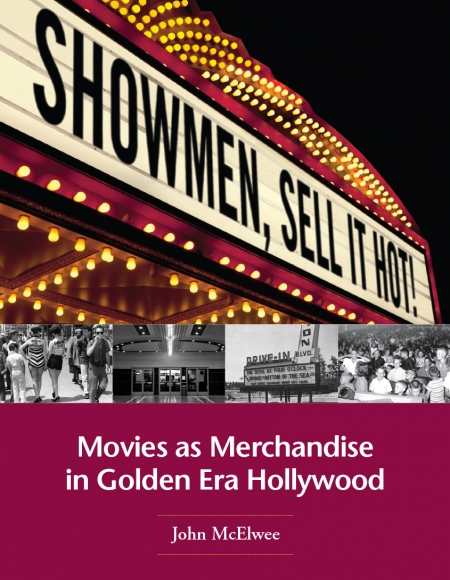
Showmen, Sell It Hot!
Movies as Merchandise in Golden Era Hollywood
A movie enthusiast shows how the mad men of film sold the show.
Film collector John McElwee’s debut book offers a detailed look at how early films, including classics such as Psycho, The Wizard of Oz, and Citizen Kane, were marketed and consumed, particularly in small-town America, where theaters were multipurpose spaces. The book’s mostly color photos of movie posters, trade ads, film stills, and theater marquees are stunning and informative, as are the financial data highlighted.
Today, movie viewing is dispersed to private devices such as the handheld DVD player or smartphone. Netflix, Redbox, and other technology companies have also drastically changed how we view films. Showmen, Sell it Hot! depicts how the movie industry used to operate while simultaneously emphasizing how some things have managed to remain the same. Exhibitors/showmen continue to compete for the attention—and money—of patrons.
Among the most interesting parts of the book is its description of how exhibitors were encouraged to market a movie in the wake of a star’s death. This dilemma remains a concern when merchandising. The chapter “Metro’s Jean Harlow Closeout Sale” details Harlow’s death at age twenty-six and how exhibitors used it to their advantage, citing the public’s insistence that the film she was working on, Sarotoga, be completed and released. Similarly, in “Warner Bros. and the James Dean Cult,” McElwee says no one wanted to appear to be “shamelessly capitalizing on the young actor’s passing,” but showmen did use the public’s sorrow to get them to buy tickets to Rebel Without a Cause and other movies Dean appeared in.
Though the book is a thorough look at how exhibitors used their pressbooks to lure patrons into theaters, it is also an examination of McElwee’s interest in the industry. Each chapter, from prologue to epilogue, is filled with McElwee’s memories of films, exhibitors, and marketing ploys by theaters in and around his hometown of Wilkesboro, North Carolina. He began examining the film industry as early as age twelve, and he was writing movie reviews by fourteen. While describing how local television stations censored Psycho, McElwee tells a funny anecdote about sitting with his parents poised to watch it. The adolescent makes progress until Janet Leigh and John Gavin appear scantily clad on the Zenith, and he is sent to bed.
Unfortunately, McElwee missed an opportunity to share if or how exhibitors were given direction on marketing films like Gone with the Wind and Imitation of Life. How were they told to discuss the presence of black actresses? How were exhibitors advised to sell any film with an ethnically diverse cast? Despite this, Showmen, Sell it Hot! examines an important part of the film industry. McElwee urges readers to view the few remaining movie theaters from the early twentieth century with fresh but nostalgic eyes as these theaters brace themselves for changes, especially digitizing and globalization.
Reviewed by
Kaavonia Hinton
Disclosure: This article is not an endorsement, but a review. The publisher of this book provided free copies of the book and paid a small fee to have their book reviewed by a professional reviewer. Foreword Reviews and Clarion Reviews make no guarantee that the publisher will receive a positive review. Foreword Magazine, Inc. is disclosing this in accordance with the Federal Trade Commission’s 16 CFR, Part 255.
